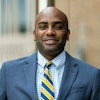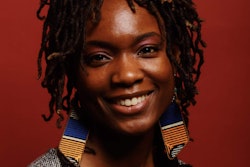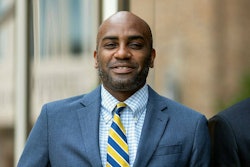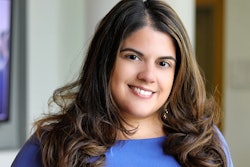Combined with racial and faculty/administrative tensions, the
take-charge style of President Eduardo J. Padron is creating a
highly-charged power struggle at Miami-Dade Community College
Dr. Eduardo J. Padron is not your average college president. With
his take-charge attitude and corporate style, he came into the helm of
Miami-Dade Community College three years ago with a bang.
Padron’s supporters describe a fierce leader who has taken great
strides for his alma mater. He’s created unprecedented diversity
throughout every facet of the college. He’s haggled impressive new
transfer agreements. And he’s wired the school to keep up with the
fast-paced technology revolution.
He was strong enough to make the tough decisions when they were
called for, they say. And even when those decisions weren’t celebrated,
he held his ground. He got the college back on sound financial footing
when miserly state funding forced the budget into the red. In short,
his take-charge style saved the school.
However, three years into Padron’s tenure, he faces a horde of
disgruntled faculty. The same confident style that drew support for him
when the former district president Dr. Robert H. McCabe retired in
1995, has turned off many of the college’s professors who now say he’s
an autocratic administrator who makes decisions with little regard for
faculty input.
Last March, after four previously failed attempts, the college’s
faculty overwhelmingly voted to unionize. More than 90 percent of the
780 full-time faculty cast ballots, with 70 percent favoring a union.
Many cited their inadequate influence with the state and national
legislatures, who were making extensive changes impacting education, as
a critical reason they needed a union. But the Miami-Dade vote in large
part turned on whether faculty here at the nation’s largest community
college agreed or disagreed with the policies — and even the
personality — of a Cuban economist turned community college president.
In May, the New Times of Miami — an alternative weekly newspaper
— slapped Padron with the label of “school yard bully” and pictured
him larger than life on its cover with faculty members fleeing from him.
The article slammed the chief administrator for what the newspaper
alleged were hard-hitting tactics, and it charged that he had earned
“the undying hostility of his own faculty.”
Now, six months after the union vote, Miami-Dade’s faculty remains fractured, its morale rock-bottom.
Some say the flack that Padron has gotten has been well-earned. But
others remain convinced that their president is unjustly criticized
merely because he is a minority president who “shook things up.”
Tough Enough for Tough Decisions
At fifty-three, Padron’s neatly-trimmed mustache and brushed-back
hair are tinged with dashes of gray. He is a well-dressed chief
administrator in dark suit and canary-yellow, speckled tie. A staple of
his uniform is a button, which glares from just beneath his lapel and
reads “Students First.”
As his eyes gaze across his humble office, out the window and over
the empire that is his community college, he smiles and avers in his
soft-spoken voice: “I don’t think there’s a better job in the world.”
And for the record, he doesn’t think there’s a finer faculty in the
world either. Several faculty members attest that his esteem is sincere.
But Padron’s trouble with the Miami-Dade faculty began when he
instituted a dire-needed, cost-cutting strategy aimed at reducing a
$3.3-million deficit.
“We had a serious problem of underfunding and we could not wait for
the money to come from heaven or the legislature,” he explains. “The
solution we needed to find was from inside.”
So he eliminated eleven of the school’s sixteen athletic teams, 119
administrative and staff positions, and gave each campus a new
president and appointed interim academic deans — all without the
counsel of the faculty.
Many say their biggest complaint with the changes is that they came so fast, with so little notice.
“We had major changes, one after the another — changes that came
as a surprise,” says Maria Mari, a business instructor at the North
campus. “You’d come to work on Monday morning and there was a memo in
your mailbox saying that what was yesterday, effective immediately, no
longer was the way things worked.”
Pamela Singer, a nursing instructor at the Medical Center campus
who has been a firm advocate for faculty input, says she couldn’t
believe that Padron was making so many changes with so little regard to
faculty recommendations.
“Maybe he has the right. But certainly, we did not feel consulted,”
she adds. “There’s a difference in what you have the right to do and
what you do if you really believe in shared governance and
collegiality.”
Padron also declined to grant continuing contracts — Miami-Dade’s
version of tenure — to any faculty during his first two years as
president, citing potential state legislation that would have
eliminated a good chunk of the college’s 50,000 students.
Then, when the Southern Association of Colleges and Schools came
last fall, many say the decision to try for a union was sealed.
Miami-Dade was up for reaccreditation. Many professors say they were
left in the dark as to who would be cited for teaching out of field.
“There had been rumors that there was a list of people who were out
of compliance,” recalls Ginger Parker, a union leader and accounting
professor at the Kendall campus. “It was almost like a communist kind
of thing. Everyone was going around asking, `Are you on the list?'”
Many professors eventually had to stop teaching subjects they had
taught for years. Others had to be retrained or were relegated to
teaching college prep courses.
“I think faculty felt like they were being left in the dark,” says
Singer, recalling the visit from the accrediting body. “Nobody was
being clear. We came to not trust what the administration said. I felt
that people were lying to me, were lying by omission. That’s when
things started to fall apart.”
That’s precisely when Singer and other organizers started to rally the faculty for another union election.
Padron, the son of a former union leader, didn’t waste any time
doing what he had warned in a memorandum to the faculty a week before
the election. Arguing that the administration could not bargain with
two entities, he promptly suspended the faculty senates and many
college-wide committees they created.
The “Palace Brigade”
To mute controversy over the senates’ dissolution, Padron created a new seventeen-member faculty commission.
Unceremoniously dubbed — among a swarm of other derogatory names
— the “Eduardo Padron Palace Brigade,” many commission members say
they have been ostracized by the faculty.
Joe McNair, a commission member, says he was called names by people he didn’t even know.
“People were calling us the Vichy government and all of that kind
of nonsense — people who didn’t know you, didn’t know what you
represented,” he recalls.
After a month of deliberating, the commission devised a new system
that calls for a thirty-nine-member panel consisting of twenty-two
faculty representatives. Half will be elected; the other half,
appointed. But while some faculty say that’s no substitute for the
senates, Padron is delighted.
In his view the new configuration will allow significant ownership
for the faculty. He also says that being able to appoint half of the
faculty gives him a chance to ensure diversity in the representation.
“If you talk to some people, there were people that could never get
elected because of the way they looked, the way they talked, the color
of their skin, or because they were too liberal or they were this or
that,” he says. “If you did not belong to a specific class that had
prevailed and predominated, you could not get elected.”
Others disagree. “All you had to do was send in a nomination form,”
says Mari. “There wasn’t turnover because, let’s be honest, there were
people who weren’t interested in serving.”
But Padron points out that no African Americans were voted-in when
the faculty recently chose its eleven elected members. McNair, a North
campus education professor, says he never stood a chance of getting
elected.
“There was no way in hell that anybody was going to pick me. There
was this sense of an old-boy, old-girl exclusive network among the
faculty. The previous administration played into that. ‘Run stuff by
them, they’ve been collaborators.’ It was always the same people
getting the same positions, getting the same trips.”
The new faculty panel, he says, is “far more representative than
anything we’ve ever had before, including young members as well as all
the various elements of diversity.”
McNair says that although he probably will join the union
eventually because they are representing him in the bargaining process,
he wouldn’t have voted for it.
“Frankly speaking, I saw the same old faces moving to the head of
the union,” he says. “And I wondered what is going to happen to our
college if we go into that kind of divisive rank and file
administration dichotomy.”
The reason, McNair speculates, that the union won this time is
because faculty members who had been at the college for a long time
were used to certain privileges.
“There was a period around here that can only be marked as
hysterical. People were running around, worried about what was going to
happen to them and under those conditions. People tend to want to bind
together and protect themselves,” McNair says. “It is my opinion that
this faculty responds rapidly and quickly to threats to their status
quo, particularly when they were doing pretty good.”
It’s Not About Race, Is It?
Additionally, McNair says that far from the tyrant some faculty
believe him to be, Padron is a strong-willed administrator who isn’t
liked by some because he is a minority.
“I think the flack that Dr. Padron is getting right now is because
he is a Hispanic president of a college,” he says. “He may not be a
very likable person, but he can make the tough decisions. I saw
instances in the previous administration where tough decisions were
required [and] they weren’t taken.”
Contrary to McNair’s assessment, other faculty argue that racism just isn’t intrinsic at the college.
“I would never say that racism does not exist in the United States.
However, it’s not institutional at Miami-Dade Community College,” says
Singer. “Is there somebody out there that doesn’t like him because he’s
Cuban? That’s possible. But I think that political correctness is a
little bit too deeply ingrained where we are. It would not be tolerated
on an institutional scale.”
But McNair insists that many people just don’t like the fact that
Padron has promoted several minorities. In fact, for the first time
there are two African American and two Hispanic academic deans.
“If we’re going to address the real issue of diversity and
representation in these kinds of workplaces, it’s going to take
measures more than just the traditional, democratic, majority rule,”
McNair says. “It’s okay when you are part of the majority. It has never
worked when you’re not.
“I look at our structure right now with five or six female deans,
and I don’t think there’s another place that can brag about that. This
is a tremendous step that would not have happened under another regime.
The major pain that I see in a lot of this shake-up is the pain that
comes when the status quo is shaken and people don’t know what’s going
to happen.”
Padron remains committed to promoting people of color at the college when ever possible.
“In the past we did not look deep enough and see people for their
qualities,” he says. “I want from top to bottom, for the school to
reflect the students. That’s one of my goals.”
For his efforts, he says he’s even been threatened, although he remains unfazed.
“I don’t let that bother me because it’s nothing new. I’ve been
facing racism for many years. And many of the things that I have done
have created a lot of threatening letters, anonymous phone calls, and
all kinds of underlying things that if you really look at them close,
are based on racism,” he says. “If I remove a minority from a position,
nobody says anything. If I remove a White male from a key position,
it’s because I want to put a token in there.
“It’s difficult when people have been used to having things their
way or one way to all of a sudden have to share that power or share a
mission and a vision with people that are very different from them.”
Nevertheless, Padron admits that the “shake-up” is not the sole reason for faculty discontent.
“I don’t want to make this [race factor] bigger than it should be.
It’s just one element. There are other elements here,” he says.
COPYRIGHT 1998 Cox, Matthews & Associates
© Copyright 2005 by DiverseEducation.com















